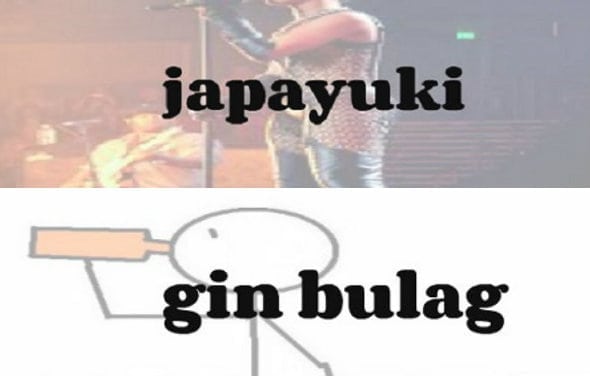11 Filipino Slang Words With Surprising Origins

Just like humans, our language also has its own evolutionary process. Although there is a thing we call standard usage, there are certain group of people who create language variations to be used within their exclusive circle. Some of these words eventually make it to the mainstream, and people start using them as part of their daily vocabulary.
Here in the Philippines, we are aware that young Pinoys were the ones who coined informal terms such as yosi (cigarette), syota (girlfriend), and sosi (social). The gay community is also proud of its own contributions to the Pinoy slang dictionary: Words such as bagets (young), chika (chat), tsimay (housemaid), and jowa (partner) among others.
Also Read: 30 Filipino Words With No English Equivalent
Pinoy slang is also formed by giving new meaning to already existing Filipino words. Examples of these include ahas (snake, for traitor) and ube (color violet, to mean 100 pesos).
The list of Pinoy slang words is almost endless, but have you ever wondered how some of these words were coined? Here are some of the most popular Filipino slang words and their surprisingly badass origins:
1. Jeproks
Meaning: An urban slang term used to describe a cool, somewhat smart but easy-going young man.
Origin: Popular during the 1970’s, the term was brought into the mainstream by rock singer Mike Hanopol via the song “Laki sa Layaw (Jeproks).” It is actually the reversed form of the word “project.” When it was first used in the 1960’s, “jeproks” was synonymous to young people who came from the housing projects of the government (e.g., Project 2, Project 4).
2. Praning
Meaning: Paranoid; haywire.
Origin: The exact origin of this urban slang term hasn’t been determined yet. However, some say it came from the drug subculture. It is said that praning was first used to describe someone who is “hallucinating” or “under the influence of drugs” during the same era when lasing became the slang term for “drunk.”
Praning became even more popular in the 90’s after Filipino rapper Francis Magalona released his second album in 1992. Entitled Rap is FrancisM, it features the hit song “Mga Praning” which is about people whose lives are destroyed by drug addiction.
Also Read: 11 Shapes You Didn’t Know Had Filipino Names
3. Bagets
Meaning: Teenager; opposite of “forgets” which is a term for the oldies.
Origin: The word came from the 1984 Filipino youth-oriented comedy movie of the same name. In an interview with The Philippine Star, actor William Martinez, one of the film’s lead stars, revealed that the word was coined by Alona Alegre. The latter derived it from the slang term bagito which means new or inexperienced (greenhorn).
4. Japayuki
Meaning: Several years ago–specifically during the 1980’s–the term “japayuki” was used to refer to young women, mostly Filipinas, who came to Japan to work as entertainers or cultural dancers. Since the early 90’s however, the word has earned a negative connotation: It now refers to Filipinas who came to Japan to work as entertainers but ended up working as prostitutes.
Origin: Since the mid-nineteenth century, Japanese peasant girls had been trafficked from Japan to other Southeast Asian countries–including the Philippines–for the sole purpose of prostitution. Most of these Japanese girls arrived in China, hence they were called “karayuki-san” or “Ms. Gone to China.”
Also Read: 16 Colors And Their Beautiful Names In The Philippine Language
By the mid-twentieth century, Japan started to take a turn for the better. At that point, they’re no longer a “sending country”; women from other countries are now coming to Japan to work as prostitutes. These young foreign girls were called “japayuki-san” or “Ms. Gone to Japan,” a term which later gave birth to the Filipino slang word of today.
5. Chugi
Meaning: Killed; cancelled; fired; or deleted.
Origin: This is one of the slang words we borrowed from the “swardspeak,” also known as gay lingo. It is said that “chugi” was loosely based on the onomatopoeic words “tsuk,” tsak,” and “chug,” which imitate the sound of knife being embedded into someone’s body and were commonly used in Filipino komiks before.
Also Read: Top 10 Pinoy Superheroes You’ve Probably Never Heard Of
6. Churva
Meaning: A slang term or expression used by the speaker as a filler for something that cannot be adequately expressed or explained.
Origin: Another word coined by the gay community, “churva” is said to be derived from the Greek word “cheorvamus” which is defined as “a word used in place of something you want to express but you cannot verbalize.”
7. Gin-Bulag
Meaning: A slang word for non-branded gin made from low-quality ingredients; opposite of the popular brand of gin with “marka demonyo.”
Also Read: The Fascinating Origin of Ginebra’s Marca Demonio
Origin: The term “gin bulag” refers to a gin of unknown sources that–as some people believe–may make one go blind, hence the name. The word gin, on the other hand, came from “genver,” the Dutch word for juniper which is the plant whose berries give the drink its unique taste.
8. Ngek! (or Ngeeek!)
Meaning: A Pinoy slang word or expression that can be equivalent to “Oh” (but in a surprised way) or “Yikes!”
When someone utters this word, it’s either the speaker made a mistake or someone else did/said something ridiculous or crappy.
Origin: It is said that “ngek!” is yet another term of onomatopoeic origins. It imitates the sound of a buzzer in a quiz show which indicates that the player’s answer is wrong.
Try This: FilipiKnow’s Ultimate Tagalog-English Dictionary
9. Senglot
Meaning: Drunk or tipsy.
Origin: This slang term is the reversed form of the word “laseng” or “drunk” in English.
“But why the change in spelling?” you may ask. Well, it actually came from the word “lasing,” which most Filipinos pronounce as “laseng.” They then reversed the syllables so now it became “sengla.” The “-lot” probably came from “kelot,” a slang term for a guy or man. Either they thought “sengla” was too feminine or they’re aware that tomadors (i.e. alcoholics) are mostly men. The slang word was coined in the mid-fifties but is still widely used today.
10. Toka
Meaning: A slang term for “duty assignment.”
Origin: This word probably came from “tocar,” a Spanish term which means “turn.”
11. Tukmol
Meaning: An ugly person; stupid or dumb ass.
Origin: The U.P. Diksiyonaryong Filipino defines “tukmol” as “isang uri ng ilahas na kalapati; pagaw o turtledove.” But due to its onomatopoeic quality, some people probably adopted it and turned it into a slang term for someone or something “that is overly ugly.”
Also Read: 70 Things You Didn’t Know Had Filipino Names
References
Almario, V. (2010). UP Diksiyonaryong Filipino. 2nd ed. Pasig City: Anvil Publishing, Inc., p.1283.
Fenix, M. (2013). Filipinos are the world’s biggest consumers of gin, but…. [online] INQUIRER.net. Available at: http://goo.gl/AzOv9R [Accessed 12 Sep. 2014].
Himig – The Filipino Music Collection of FHL, (n.d.). Filipino Music Trivia. [online] Available at: http://goo.gl/sxiUYb [Accessed 11 Sep. 2014].
Lo, R. (2006). Bagets Forever. [online] philSTAR.com. Available at: http://goo.gl/I9Y9f5 [Accessed 11 Sep. 2014].
Okubo, S. and Shelley, L. (2011). Human Security, Transnational Crime and Human Trafficking: Asian and Western Perspectives. 1st ed. Routledge, pp.216-217.
Rubrico, J. (2013). Sociolinguistics: Society and Language. 1st ed. [ebook] pp.1-2. Available at: http://goo.gl/edYBVr [Accessed 11 Sep. 2014].
Zarafte, E. (2007). Malictionary 2. 1st ed. Mandaluyong City: National Book Store.
Zarate, E. (2009). Malictionary 3. 1st ed. Mandaluyong City: National Book Store.
FilipiKnow
FilipiKnow strives to ensure each article published on this website is as accurate and reliable as possible. We invite you, our reader, to take part in our mission to provide free, high-quality information for every Juan. If you think this article needs improvement, or if you have suggestions on how we can better achieve our goals, let us know by sending a message to admin at filipiknow dot net
Copyright Notice
All materials contained on this site are protected by the Republic of the Philippines copyright law and may not be reproduced, distributed, transmitted, displayed, published, or broadcast without the prior written permission of filipiknow.net or in the case of third party materials, the owner of that content. You may not alter or remove any trademark, copyright, or other notice from copies of the content. Be warned that we have already reported and helped terminate several websites and YouTube channels for blatantly stealing our content. If you wish to use filipiknow.net content for commercial purposes, such as for content syndication, etc., please contact us at legal(at)filipiknow(dot)net











